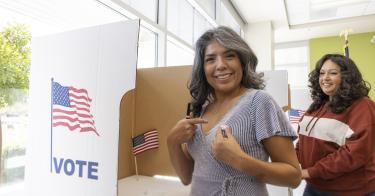Hours after Gov. Mike DeWine (R-OH) signed a new voter ID law in Ohio, the firm of Democratic super-lawyer Marc Elias announced plans to litigate against it. Abha Khanna, a partner with the Elias Law Group, echoed the Left’s evidence-free canard that "voter suppression is, unfortunately, alive and well" in Ohio.
The truth?
Eighteen other states already require photo ID to vote, out of a total of 35 states that have some form of voter ID laws. In addition to requiring stricter photo ID for voting, Ohio's new law eliminates early voting on the Monday before Election Day to allow county election boards time to prepare for Tuesday elections. It also shortens the deadline to apply for absentee ballots from noon on the third day before Election Day to the close of business on the seventh day before Election Day to ensure adequate time for applications to be processed.
This change, according to the Ohio Secretary of State’s Office, was to ensure voters don’t "unintentionally disenfranchise themselves" by procrastinating too close to Election Day. The law makes Ohioans 17 or older eligible for a free state photo ID card. Previously, Ohio’s voter ID law didn’t require a photo.
>>> Election Integrity 2022 in Review: More Improvements Than Damage
Despite dire warnings from the voter suppression hysteria industrial complex, there was never evidence that voter ID laws prevented eligible voters from casting a ballot.
That’s one reason why voters across all demographics support voter ID laws in virtually every poll by almost 80%. This typically includes more than 60% of Democrats. While the Left routinely claims that voter ID disproportionately harms minority and low-income voters, 64% of black voters, 77% of Hispanics, and 76% of low-income voters support voter ID laws, according to a poll conducted by the Honest Elections Project.
The Elias lawsuit in Ohio will likely fail, like most others against ID laws, because the evidence just isn’t there. After Republicans won control of state legislatures across the country in 2010, many passed ID laws, and the Left wailed. But nine of the 11 states that added voter ID laws in 2011 had an increase in turnout from the 2012 election to the 2016 election.
Voter ID laws can stop multiple types of fraud, such as impersonating another registered voter, preventing noncitizens from voting, and stopping out-of-state residents or someone registered in multiple jurisdictions. It’s safe to say there is bipartisan consensus for voter ID but a clear partisan divide in the political class. That wasn’t always the case.
>>> Best Practices and Standards for Election Audits
The 2005 Carter-Baker Commission report, named for former Democratic President Jimmy Carter and former Republican Secretary of State James Baker, called for voter ID. A National Bureau of Economic Research study from 2019 examined 10 years' worth of turnout data from across the country and concluded that voter ID laws have "no negative effect on registration or turnout overall or for any specific group defined by race, gender, age, or party affiliation." The same study also determined ID laws have "no significant effect" on preventing fraud, but prevention-based laws could be based on proving a negative.
Moreover, 33 of the 37 members of the Organization for Economic Cooperation and Development have voter ID laws. The exceptions are Britain, Japan (which instead has barcoded tickets), New Zealand, and Australia.
The public gets it, and so does most of the rest of the world. The question is whether the American Left takes its own arguments seriously.
This piece originally appeared in the Washington Examiner



